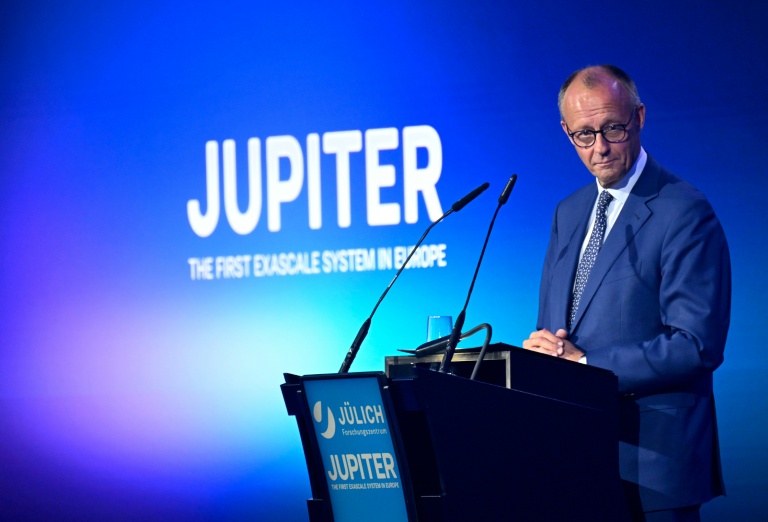Science
Merz Launches Europe’s Fastest Supercomputer to Boost AI Capabilities

German Chancellor Friedrich Merz inaugurated Europe’s fastest supercomputer, known as Jupiter, on March 15, 2024, in Juelich, Germany. During the event, Merz expressed confidence that Europe can close the gap in the global artificial intelligence (AI) race, currently dominated by the United States and China. “The United States and China are in a neck-and-neck race to compete for future market share in an AI-supported global economy,” he stated.
Jupiter is a groundbreaking machine that can perform at least one quintillion calculations per second, a significant leap in computational power. Housed within a facility approximately half the size of a football pitch, the supercomputer is equipped with around 24,000 Nvidia chips, which are highly regarded in the AI sector. Experts believe this is the first supercomputer in Europe that can be deemed internationally competitive for training AI models.
Merz emphasized the importance of developing sovereign computing capacities in Germany and Europe. “We need sovereign computing capacities that are on a par with our international competitors,” he remarked. He added that this endeavor is crucial not only for competitiveness but also for the security of the nation.
The 500-million-euro (approximately $580 million) supercomputer will have applications extending beyond artificial intelligence. Researchers from various fields will utilize its capabilities to enhance climate forecasts, which can aid in predicting extreme weather events, as well as to advance medical research and studies related to the energy transition.
The inauguration of Jupiter marks a significant step for Europe in the AI landscape, as it aims to position the continent as a key player in the rapidly evolving technology sector. The supercomputer’s development is seen as a response to increasing competition from global leaders in AI and a commitment to fostering innovation within Europe.
With a diverse workforce of 2,400 staff representing 100 different nationalities, Jupiter is set to become a hub for cutting-edge research and development in the heart of Europe. As the demand for advanced computing power continues to rise, the launch of Jupiter could pave the way for Europe to regain its footing in the global technology arena.
-

 Science3 months ago
Science3 months agoToyoake City Proposes Daily Two-Hour Smartphone Use Limit
-

 Top Stories3 months ago
Top Stories3 months agoPedestrian Fatally Injured in Esquimalt Collision on August 14
-

 Health3 months ago
Health3 months agoB.C. Review Reveals Urgent Need for Rare-Disease Drug Reforms
-

 Technology3 months ago
Technology3 months agoDark Adventure Game “Bye Sweet Carole” Set for October Release
-

 World3 months ago
World3 months agoJimmy Lai’s Defense Challenges Charges Under National Security Law
-

 Lifestyle3 months ago
Lifestyle3 months agoVictoria’s Pop-Up Shop Shines Light on B.C.’s Wolf Cull
-

 Technology3 months ago
Technology3 months agoKonami Revives Iconic Metal Gear Solid Delta Ahead of Release
-

 Technology3 months ago
Technology3 months agoApple Expands Self-Service Repair Program to Canada
-

 Technology3 months ago
Technology3 months agoSnapmaker U1 Color 3D Printer Redefines Speed and Sustainability
-

 Technology3 months ago
Technology3 months agoAION Folding Knife: Redefining EDC Design with Premium Materials
-

 Business3 months ago
Business3 months agoGordon Murray Automotive Unveils S1 LM and Le Mans GTR at Monterey
-

 Technology3 months ago
Technology3 months agoSolve Today’s Wordle Challenge: Hints and Answer for August 19









